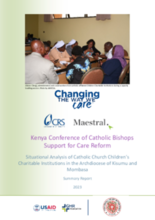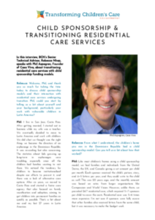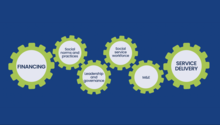Displaying 11 - 20 of 691
This study aimed to gather data on Catholic Church Children’s Charitable Institutions (CCI) operations in Kenya, the children they serve, and the challenges they face, to inform future care reform strategies.
Listen to transition support experts David Musa and Yatta Palmer of the Child Reintegration Centre (CRC) explain how transition is getting more children home to family and learn about the challenges, successes, and the powerful role of the CRC in revolutionizing child welfare in Sierra Leone.
Este artigo explora o papel da avaliação e gestão de caso no contexto das reformas do sistema de cuidados alternativos. Oferece princípios transversais de boas práticas, as etapas essenciais e descreve os fatores críticos envolvidos nas práticas de avaliação e gestão de caso eficazes. Baseando-se na literatura da região, o artigo visa fornecer uma orientação abrangente aos profissionais e às partes interessadas envolvidas nos cuidados, no bem-estar e na proteção das crianças. O anexo fornece detalhes dos recursos de avaliação e gestão de caso da região da África Oriental e Austral e também em outros lugares.
In this interview, BCN’s Senior Technical Advisor, Rebecca Nhep, speaks with Phil Aspegren, Founder of Casa Viva, about transitioning residential care services with child sponsorship funding models.
The Moldova Ministry of Labor and Social Protection, in cooperation with CTWWC Moldova and local partner CCF Moldova, organized an international conference on March 21, 2024. More than 100 participants, representing the wide array of care reform actors and decision makers in the central and local government, NGOs, academia and international experts, reviewed findings of the Bucharest Early Intervention Project and national research conducted in 2023 on the potential for a moratorium on placing children 0-6 in institutional care.
This is a tool that ensures all components of child protective care: health, adequate nutrition, care, safety and early education, through the intersectoral collaboration between the Ministry of Labor and Social Protection, the Ministry of Health, the Ministry of Education and Research and local public administration authorities.
Foaia de parcurs pentru încetarea plasamentului copiilor din grupa de vârstă 0-6 ani în îngrijire rezidențială este un instrument care asigură toate componentele îngrijirii protectoare ale copilului: sănătate, alimentație adecvată, îngrijire, siguranță și educație timpurie, prin colaborarea intersectorială dintre Ministerul Muncii și Protecției Sociale, Ministerului Sănătății, Ministerul Educației și Cercetării și autoritățile administrației publice locale.
The Care Reform Roadmap (2024-2028) lays out the strategic actions for caring for vulnerable children in Ghana, led by the Ministry of Gender, Children, and Social Protection.
The webinar took place on 30 April 2024 and focused on Chapter IV of the Guidelines: Deinstitutionalization grounded in the dignity and diversity of persons with disabilities, and how they relate to children and other children and other at-risk populations, such as elders and women.
Delia Pop, the director of Tanya's Dream Fund, leads grant giving and advocacy strategies in Bulgaria along with working with UNICEF. In this episode she shares her extensive knowledge on creating strong strategy reforms.








